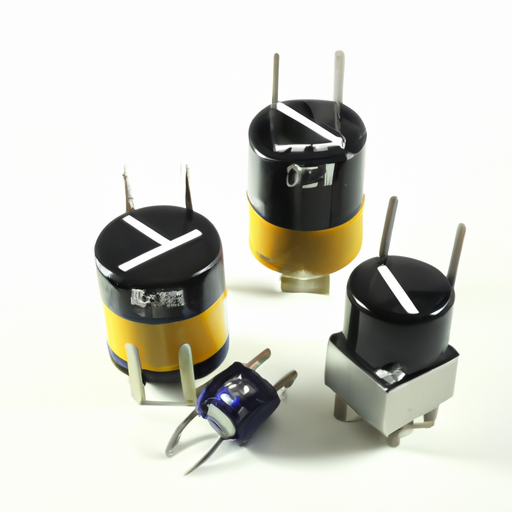The Role of Coupling Capacitor Products in Practical Applications

I. Introduction
In the realm of electronics, coupling capacitors play a pivotal role in ensuring the smooth operation of various circuits. These components are essential for transmitting signals while blocking direct current (DC), thereby allowing alternating current (AC) signals to pass through. This blog post aims to explore the significance of coupling capacitors in practical applications, shedding light on their functionality, design considerations, and future trends.
II. Understanding Coupling Capacitors
A. Basic Principles of Capacitors
At their core, capacitors are passive electronic components that store and release electrical energy. The fundamental property of a capacitor is its capacitance, which is measured in farads (F). Capacitance indicates the amount of charge a capacitor can store per unit voltage. Capacitors come in various types, including ceramic, electrolytic, film, and tantalum, each with unique characteristics suited for different applications.
B. Specific Characteristics of Coupling Capacitors
Coupling capacitors are designed to facilitate the transfer of AC signals between different stages of a circuit while blocking DC components. This functionality is crucial in maintaining signal integrity and preventing unwanted DC bias from affecting subsequent stages. Coupling capacitors exhibit specific frequency response characteristics, which determine their impedance at various frequencies. This frequency response is vital for ensuring that the desired signals are transmitted effectively while minimizing distortion.
III. Applications of Coupling Capacitors
A. Audio and Signal Processing
In audio applications, coupling capacitors are integral to audio amplifiers. They allow audio signals to pass from one stage of amplification to another while blocking any DC offset that could distort the sound. By maintaining signal integrity, coupling capacitors help reduce noise and improve overall audio quality. In signal processing, they are used to filter out unwanted frequencies, ensuring that only the desired signals are amplified.
B. RF and Communication Systems
In radio frequency (RF) and communication systems, coupling capacitors are essential for coupling RF amplifiers. They help match the impedance between different circuit stages, optimizing power transfer and minimizing signal loss. Additionally, coupling capacitors are used in filtering applications to eliminate unwanted noise and harmonics, ensuring clear and reliable communication.
C. Power Electronics
In power electronics, coupling capacitors serve a critical role in DC blocking applications. They prevent DC voltage from passing through to sensitive components, protecting them from damage. Coupling capacitors also contribute to voltage regulation and stability in power supply circuits, ensuring that the output voltage remains consistent and reliable.
D. Other Practical Applications
Coupling capacitors find utility in various other applications, including sensors and transducers. They help couple the output of sensors to processing circuits, ensuring accurate signal transmission. In oscillators and timers, coupling capacitors are used to control frequency response and timing characteristics, making them essential for precise timing applications.
IV. Design Considerations for Coupling Capacitors
A. Selecting the Right Capacitor Type
Choosing the appropriate type of capacitor is crucial for optimal performance. Ceramic capacitors are often favored for their stability and low ESR, making them suitable for high-frequency applications. Electrolytic capacitors, on the other hand, offer higher capacitance values but may have higher ESR and leakage current. Film capacitors are known for their reliability and low distortion, while tantalum capacitors provide compact size and high capacitance.
B. Capacitance Value Determination
Determining the right capacitance value is essential for achieving the desired frequency response. A larger capacitance value allows lower frequencies to pass through, while a smaller value may filter out low frequencies. Designers must balance size and performance, as larger capacitors can take up more space on a circuit board.
C. Voltage Ratings and Reliability
Voltage ratings are critical when selecting coupling capacitors. It is essential to choose capacitors with voltage ratings that exceed the maximum voltage they will encounter in the circuit. Derating capacitors—selecting components with a voltage rating significantly higher than the operating voltage—can enhance reliability and longevity. Environmental considerations, such as temperature and humidity, also play a role in capacitor selection, as these factors can affect performance.
V. Challenges and Limitations
A. Non-Ideal Behaviors of Capacitors
Despite their essential role, coupling capacitors exhibit non-ideal behaviors that can impact circuit performance. Equivalent series resistance (ESR) can introduce losses and affect the frequency response of the circuit. Leakage current, which occurs when a small amount of current flows through the capacitor even when it is not in use, can also lead to signal degradation. Dielectric absorption, where a capacitor retains some charge after being discharged, can further complicate signal integrity.
B. Impact of Temperature and Aging
Temperature variations can significantly affect capacitor performance. As temperature increases, the capacitance value may change, leading to altered circuit behavior. Aging can also impact capacitors, causing changes in capacitance, ESR, and leakage current over time. Designers must account for these factors to ensure long-term reliability.
C. Mitigation Strategies in Design
To mitigate the challenges associated with coupling capacitors, designers can implement various strategies. Selecting high-quality capacitors with low ESR and leakage current can enhance performance. Additionally, incorporating bypass capacitors can help filter out high-frequency noise, improving overall circuit stability.
VI. Future Trends and Innovations
A. Advances in Capacitor Technology
The field of capacitor technology is continually evolving, with advancements in materials and manufacturing techniques. New materials, such as organic and nanostructured dielectrics, are being explored to enhance capacitance and reduce size. Miniaturization is a key trend, allowing for the integration of capacitors with other components on a single chip, leading to more compact and efficient designs.
B. Emerging Applications in Renewable Energy and Electric Vehicles
As the world shifts towards renewable energy and electric vehicles, the demand for coupling capacitors is expected to grow. In renewable energy systems, coupling capacitors are used in inverters to convert DC from solar panels to AC for grid integration. In electric vehicles, they play a role in power management and signal processing, ensuring efficient operation.
C. The Role of Coupling Capacitors in the Internet of Things (IoT)
The Internet of Things (IoT) is another area where coupling capacitors are becoming increasingly important. As IoT devices become more prevalent, the need for reliable signal transmission and power management is critical. Coupling capacitors will play a vital role in ensuring that these devices operate efficiently and effectively.
VII. Conclusion
In conclusion, coupling capacitors are indispensable components in modern electronics, facilitating signal transmission while blocking unwanted DC components. Their applications span a wide range of fields, from audio processing to power electronics and communication systems. As technology continues to advance, the role of coupling capacitors will only become more significant, driving innovation and enhancing the performance of electronic devices. Understanding the intricacies of coupling capacitors is essential for engineers and designers, encouraging further exploration and mastery of these vital components in practical applications.
The Role of Coupling Capacitor Products in Practical Applications

I. Introduction
In the realm of electronics, coupling capacitors play a pivotal role in ensuring the smooth operation of various circuits. These components are essential for transmitting signals while blocking direct current (DC), thereby allowing alternating current (AC) signals to pass through. This blog post aims to explore the significance of coupling capacitors in practical applications, shedding light on their functionality, design considerations, and future trends.
II. Understanding Coupling Capacitors
A. Basic Principles of Capacitors
At their core, capacitors are passive electronic components that store and release electrical energy. The fundamental property of a capacitor is its capacitance, which is measured in farads (F). Capacitance indicates the amount of charge a capacitor can store per unit voltage. Capacitors come in various types, including ceramic, electrolytic, film, and tantalum, each with unique characteristics suited for different applications.
B. Specific Characteristics of Coupling Capacitors
Coupling capacitors are designed to facilitate the transfer of AC signals between different stages of a circuit while blocking DC components. This functionality is crucial in maintaining signal integrity and preventing unwanted DC bias from affecting subsequent stages. Coupling capacitors exhibit specific frequency response characteristics, which determine their impedance at various frequencies. This frequency response is vital for ensuring that the desired signals are transmitted effectively while minimizing distortion.
III. Applications of Coupling Capacitors
A. Audio and Signal Processing
In audio applications, coupling capacitors are integral to audio amplifiers. They allow audio signals to pass from one stage of amplification to another while blocking any DC offset that could distort the sound. By maintaining signal integrity, coupling capacitors help reduce noise and improve overall audio quality. In signal processing, they are used to filter out unwanted frequencies, ensuring that only the desired signals are amplified.
B. RF and Communication Systems
In radio frequency (RF) and communication systems, coupling capacitors are essential for coupling RF amplifiers. They help match the impedance between different circuit stages, optimizing power transfer and minimizing signal loss. Additionally, coupling capacitors are used in filtering applications to eliminate unwanted noise and harmonics, ensuring clear and reliable communication.
C. Power Electronics
In power electronics, coupling capacitors serve a critical role in DC blocking applications. They prevent DC voltage from passing through to sensitive components, protecting them from damage. Coupling capacitors also contribute to voltage regulation and stability in power supply circuits, ensuring that the output voltage remains consistent and reliable.
D. Other Practical Applications
Coupling capacitors find utility in various other applications, including sensors and transducers. They help couple the output of sensors to processing circuits, ensuring accurate signal transmission. In oscillators and timers, coupling capacitors are used to control frequency response and timing characteristics, making them essential for precise timing applications.
IV. Design Considerations for Coupling Capacitors
A. Selecting the Right Capacitor Type
Choosing the appropriate type of capacitor is crucial for optimal performance. Ceramic capacitors are often favored for their stability and low ESR, making them suitable for high-frequency applications. Electrolytic capacitors, on the other hand, offer higher capacitance values but may have higher ESR and leakage current. Film capacitors are known for their reliability and low distortion, while tantalum capacitors provide compact size and high capacitance.
B. Capacitance Value Determination
Determining the right capacitance value is essential for achieving the desired frequency response. A larger capacitance value allows lower frequencies to pass through, while a smaller value may filter out low frequencies. Designers must balance size and performance, as larger capacitors can take up more space on a circuit board.
C. Voltage Ratings and Reliability
Voltage ratings are critical when selecting coupling capacitors. It is essential to choose capacitors with voltage ratings that exceed the maximum voltage they will encounter in the circuit. Derating capacitors—selecting components with a voltage rating significantly higher than the operating voltage—can enhance reliability and longevity. Environmental considerations, such as temperature and humidity, also play a role in capacitor selection, as these factors can affect performance.
V. Challenges and Limitations
A. Non-Ideal Behaviors of Capacitors
Despite their essential role, coupling capacitors exhibit non-ideal behaviors that can impact circuit performance. Equivalent series resistance (ESR) can introduce losses and affect the frequency response of the circuit. Leakage current, which occurs when a small amount of current flows through the capacitor even when it is not in use, can also lead to signal degradation. Dielectric absorption, where a capacitor retains some charge after being discharged, can further complicate signal integrity.
B. Impact of Temperature and Aging
Temperature variations can significantly affect capacitor performance. As temperature increases, the capacitance value may change, leading to altered circuit behavior. Aging can also impact capacitors, causing changes in capacitance, ESR, and leakage current over time. Designers must account for these factors to ensure long-term reliability.
C. Mitigation Strategies in Design
To mitigate the challenges associated with coupling capacitors, designers can implement various strategies. Selecting high-quality capacitors with low ESR and leakage current can enhance performance. Additionally, incorporating bypass capacitors can help filter out high-frequency noise, improving overall circuit stability.
VI. Future Trends and Innovations
A. Advances in Capacitor Technology
The field of capacitor technology is continually evolving, with advancements in materials and manufacturing techniques. New materials, such as organic and nanostructured dielectrics, are being explored to enhance capacitance and reduce size. Miniaturization is a key trend, allowing for the integration of capacitors with other components on a single chip, leading to more compact and efficient designs.
B. Emerging Applications in Renewable Energy and Electric Vehicles
As the world shifts towards renewable energy and electric vehicles, the demand for coupling capacitors is expected to grow. In renewable energy systems, coupling capacitors are used in inverters to convert DC from solar panels to AC for grid integration. In electric vehicles, they play a role in power management and signal processing, ensuring efficient operation.
C. The Role of Coupling Capacitors in the Internet of Things (IoT)
The Internet of Things (IoT) is another area where coupling capacitors are becoming increasingly important. As IoT devices become more prevalent, the need for reliable signal transmission and power management is critical. Coupling capacitors will play a vital role in ensuring that these devices operate efficiently and effectively.
VII. Conclusion
In conclusion, coupling capacitors are indispensable components in modern electronics, facilitating signal transmission while blocking unwanted DC components. Their applications span a wide range of fields, from audio processing to power electronics and communication systems. As technology continues to advance, the role of coupling capacitors will only become more significant, driving innovation and enhancing the performance of electronic devices. Understanding the intricacies of coupling capacitors is essential for engineers and designers, encouraging further exploration and mastery of these vital components in practical applications.













